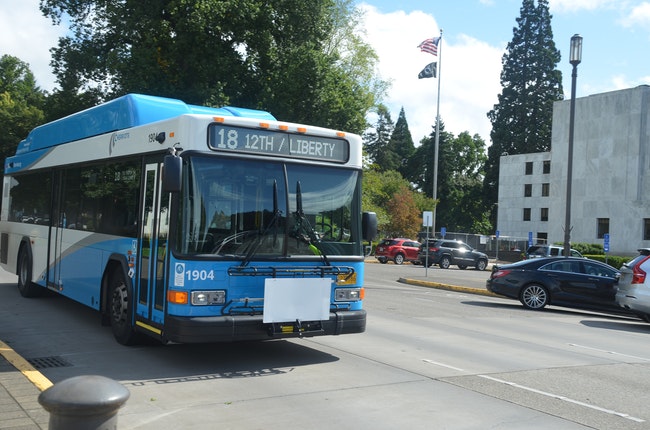
The Salem Area Mass Transit District awarded just a single contract to a company owned by a woman or minority in its most recent reporting period, well short of its own goal to see that such businesses get a share in millions in government spending.
Agency leaders point to a small pool of minority and women-owned businesses as well as there being less work and outreach because of the pandemic as reasons why it only met 16% of its contracting goal.
Between October 2019 through September 2020, Cherriots awarded 248 federally funded contracts for services and goods that totaled $1.5 million, according to a Dec. 29 internal memo provided to Salem Reporter. For that period, Cherriots had a goal of awarding $173,430 to disadvantaged business enterprises, certified as small for-profit companies that are owned by women or minorities.
During that period, Cherriots awarded one contract to one of these businesses: Marco Ideas Unlimited, a woman-owned business in Portland, paying $28,583 for uniforms.
Agency leaders have since launched a top-to-bottom review last year with the aim of meeting contracting goals while making overall operations more equitable.
“Can we do better?” said Chi Nguyen, a director on the Cherriots board and chair of its Diversity, Equity and Inclusion Committee. “I think we can, and we will.”
The federal Transportation Department started the disadvantaged business enterprise program in 1980 as a way to increase the participation of minority and women-owned businesses in federal contracting.
State and local transportation agencies that receive money from the department are required to establish goals for contracting with disadvantaged business enterprises. The federal government doesn’t penalize agencies that fail to hit their goals if they are trying.
Dan Knauss, Cherriots’ manager of procurement and contracts, explained that Cherriots’ goal is based on the number of expected projects and the number of disadvantaged business enterprises based in the Salem area or in nearby counties.
The memo blames the shortfall partially on the pandemic, which scuttled an in-person training and delaying or canceling planned projects. That’s meant less overall work companies had a shot at landing. Knauss said one notable project Cherriots had to postpone work on was the new South Salem Transit Center because of a dispute with a property owner. Final costs for the project weren’t finalized.
“That one project made up the lion’s share,” said Knauss.
Knauss said there were other large projects that were canceled. Additionally, Cherriots had to delay a contract for a survey of riders, delayed because not enough people were riding buses because of Covid, among other projects.
He said Cherriots contracted with Brown Contracting for a project at the Keizer Transit Center and the company subcontracted with two disadvantaged business enterprises, CBK Constructors LLC of Canby and Pac Green Landscape of Woodburn, paying them $62,371. But those payments recorded during the most recent reporting period didn’t count toward Cherriots’ goal.
The memo states that the agency’s potential pool of disadvantaged business enterprises is “relatively small” and outreach events were canceled because of the pandemic. Knauss said Cherriots has attended trade shows remotely this year and is preparing to distribute its outreach brochures to recruit more interest among businesses to share in the transit district’s business.
But he said disadvantaged business enterprises tend to be smaller and the requirements for government contractors can seem daunting.
Numbers provided by Cherriots show it hasn’t met its disadvantaged business enterprise goals going back four years.
In 2019, it awarded $85,445 – about half its goal and in 2018, it awarded $8,000 towards a goal of $50,505. For 2017 and 2016, the agency didn’t give any contracts to disadvantaged businesses.
Cherriots now has a goal of awarding disadvantaged business enterprises 2.49% of the $3.3 million worth of projects it has planned for fiscal years 2021 through 2023..
The Oregon Association of Minority Entrepreneurs declined to comment for this story. Salem Capitol Connections, a group that helps connect small businesses to government agencies, didn’t respond to an email seeking comment.
Ian Davidson, Cherriots’ board president, said he wants to improve the agency’s contracting with disadvantaged business enterprises. He pointed to documents showing that disadvantaged business enterprises were solicited for projects but ended up not bidding, which he said could point to other issues that stymie their participation.
He said that Cherriots is hiring a consultant to conduct an “equity analysis.” The consultant’s work is being finalized but will evaluate how Cherriots operates internally and with the community, he said.
“I’m really interested to get that critical feedback to start closing gaps,” he said.
Last June, the board created a Diversity, Equity, and Inclusion Committee as Cherriots accelerated its plan to broadly address inequities in its operations.
Nguyen said the review will highlight some of Cherriots’ “sausage-making,” exposing “dominant cultural artifacts that continue to allow oppression.” She expects the consultant’s findings will present clear actions for the transit agency.
A small business owner herself, Nguyen said she’s been struck by the lack of diversity in the pool of contractors. She also wonders if the process intended to boost contracting with disadvantaged business enterprises is itself a barrier.
“You go through all the hoops and that doesn’t guarantee you a contract,” she said.
Contact reporter Jake Thomas at 503-575-1251 or [email protected] or @jakethomas2009.
WE GET SALEM THE FACTS. Covering your community with care and depth. Salem Reporter – fair, accurate, independent. Subscribe and support our essential local service.









